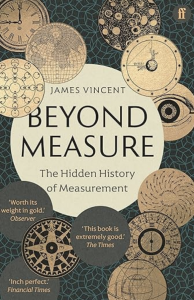How could I resist a book called Beyond Measure: The Hidden History of Measurement. By James Vincent, it’s a pacily-written whistle stop tour of – well, the history of measurement. It runs from the beginnings of standardised measurement in the ancient world through mediaeval markets, the scientific revolution, the French Revolution, land surveying, the development of statistics all the way through to the Quantified Self movement.
It’s aimed at the popular audience, getting over the key message that the measurements used to understand the world are both socially constructed and in turn construct society. “In our attempt to measure uncertainties we construct new knowledge and in doing so we inevitably remake our understanding of the world.” It also points out that measurement systems can be at the same time utopian and totalitarian – we should stay aware of the fact that reality never fits neatly into a measurement framework.
For those interested in developing new ways of measuring – like the Beyond GDP movement – the book also offers a somewhat cautionary note: “The pervasive nature of measurements helps explain why the changes to units so often occur in times of social upheava such as conquest or revolution. It is only during these moments when old sueties are tossed into the air. … that reordering of anything as fundamental as measurement can take place.” GDP itself was the progeny of world war.

